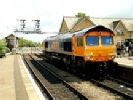Dennis Lovett - Acting Director of Corporate Affairs, Virgin Trains
5th November 2002
Written by A.J. Spencer & B.J.F. Clark
Continuing with the "Red Revolution" theme, the November 2003 lecture to the Locomotive and Carriage Institute was entitled "From Dream to Reality" and was given by the well-known railwayman and author Dennis Lovett. Dennis is currently the acting Director of Corporate Affairs for Virgin Trains and the Institute is grateful that he took the time out to come and speak to us. His in-depth lecture covered both Virgin Train's "Operation Princess", the transformation of CrossCountry rail services and the ongoing project to rejuvenate the West Coast Main Line (WCML) with new "Pendolino" titling trains and substantial infrastructure upgrades.
The following is an account of Denniss lecture:
Whatever the arguments for and against the selling off of British Rail, subsequent investment in the railways has been one of the tangible benefits of privatisation. The Euston-Liverpool/Manchester section of the WCML was originally modernised and electrified in a 175 million project that stretched from 1959 to 1967 but by the mid-1980s this original section was beginning to show signs of its age and was in serious need of further investment. Despite some staff/public service runs from 1981, technical problems and a lack of resources led to the abandonment of the Advanced Passenger Train (APT) project by BR meaning that the promise of 60 new titling trains and 140mph running for the WCML by 1984 had failed to transpire, so the route continued to be worked by (the very capable) Class 87s, and Class 86s. Despite upgrades such as the construction of Class 90 electric locomotives, further MK III coaches, and Driving Van Trailers (DVTs) to allow push-pull operation, it was clear that major investment was required and all signalling and track was due for renewal in the 1990s. A bid by InterCity for a fleet of 30 "IC250" 155mph trains to run on renewed infrastructure was rejected by the Treasury in July 1992 and a further bid in 1993 for 10 IC225s for priority WCML workings was also turned down. Similarly, the InterCity CrossCountry services had been run using "second hand" stock and locomotives with the operation being crossed-subsidised by other parts of BR.
Virgin successfully bid to operate both the WCML and the CrossCountry franchises on the basis of substantial investment in new trains and upgraded infrastructure:
Virgin CrossCountry (VXC) - "Operation Princess" - The New Dawn
A fifteen-year CrossCounty franchise was awarded to Virgin Trains on 15th January 1997 following their successful bid based on 6 delivery points:
- A "world class" travel experience;
- Brand new trains for the entire fleet;
- A new clock face timetable across the UK;
- A national rail network linking the regional centres;
- Journey time accelerations of 20% or better;
- A doubling of the number of passengers carried from the level seen at the commencement of the franchise.
The pledge to purchase a new fleet of trains for VXC was duly met when, on the 4th December 1998, a 1.06 billion "build and maintain" order was placed with Bombardier Transportation for 78 new "Voyager" trains. 34 of these trains were to be 125-mph Class 220 4-car non-tilting Voyagers, whilst 44 were to be 125mph Class 221 5-car tilting "Super Voyagers", giving a total build of 352 coaches.
Design and body shell construction was undertaken at Brugge in Belgium, whilst the bogies came from France and the final fitting out of the trains was conducted at both Brugge and the former Procor site at Horbury Junction Wakefield, Yorkshire.
As well as a design speed of 125, a sports-car type acceleration of 0-60mph in just over a minute (which is twice as fast as an HST) allow Voyagers to reduce journey times in line with franchise commitments and helps to push competitiveness with domestic flights. It is intended that 60% of the VXC routes will be cleared for 100-125mph running, once Railtrack (now Network Rail) have completed upgrading work. The Voyagers offer many on-train facilities not previously seen before in the UK, including digital seat reservations, at seat audio entertainment and an on-board shop!
The first complete Voyager train was finished in Belgium in autumn 2000, and the first operational Voyager arrived in the UK for testing in January 2001. A press run was staged in Belgium, between Brugge and Oostende also some testing and crew training took place. The first public run was an unadvertised relief' service from Birmingham to Reading on May 21st 2001 and the official service launch of the Voyagers was made by Sir Richard Branson on the 5th June 2001. Completed Voyager deliveries allowed VCX loco. hauled services to end on 19th of September 2002, with the major timetable change and re-launch that formed the basis of VXC "Operation Princess" commencing on 30th of September 2002.
VXC is the only national Train Operating Company (TOC) and the planning behind Operation Princess took four years of negotiation; with 7 different Railtrack Zones, 18 other TOCs, the Strategic Rail Authority (SRA), and 150 councils in 235 MPs constituencies. Railtrack also spent 200 million on infrastructure upgrades in advance of the launch of the new CrossCountry timetable.
Dennis conceded that, such was the success of VXC in increasing passenger numbers by 40% since the launch of Operation Princess, overcrowding has become a serious problem on many services and in the long-term it would be necessary to lengthen Class 220 train formations from 4 to 5 cars. He also noted that the first issue to resolve here was a decision as to who will pay for this!
As is nowadays the norm in all modern traction and rolling-stock orders, 690 million of the total project costs were attributed for the maintenance side of the build and maintain type agreement with Bombardier Transportation. As part of this contract to maintain the Voyagers for the duration of the VXC franchise, Bombardier constructed a new 30 million purpose-built depot for the fleet known as "Central Rivers" situated at Barton-under-Needwood, near Burton-on-Trent close to the heart of most of the VXC routes. This was the first depot constructed or utilised solely for CrossCountry services and is reputedly a very impressive maintenance site to visit by virtue of its clean and organised interior and efficiency of operation.
West Coast Main Line (WCML) - The "Red Revolution"
Virgin commenced running a fifteen-year franchise on the West Coast route on the 9th of March 1997. For the Euston - Holyhead route, four four-car Class 221s have been purchased as part of the VXC deal are due to replace HST sets in 2003. For the rest of the WCML services a new 6,800 hp tilting "Pendolino" train will provide the "Red Revolution". Dennis noted that Virgin Trains operates 17 stations on the WCML and that these have been upgraded as part of the WCML project. During 1999 contracts worth a total of 1.2 billion were placed with Alstom/Fiat for the supply and maintenance of 53 Pendolino trains; 44 eight-car trains (seating 365 people) and 9 nine-car trains, with an option to order an extra 44 standard class vehicles for 44 million to make all Pendolincs nine-cars long. Following a review of the WCML project by Virgin Trains in 2002, it was decided to take up the option of 44 further coaches, each of which can hold 76 passengers, and they will be delivered at the end of the production run. The first two Pendolinos, 390 001 Virgin Pioneer and 390 002 Red Revolution, were built by Alstom within a year of December 1999 exclusively for pre-series type testing and where not fitted out internally. The first Pendolino to actually be accepted by Virgin was 390 006 on 21st June 2001.
Testing of the Pendolinos continues and, at the time of writing, is concentrated on Alstom's Midlands Test Centre at Ashfordby and on the so called "Test Site A" between Carnforth and Carlisle on the WCML.
Driver training began in July 2002, and on the 21st of that month the first 125mph run of a Pendolino on the WCML took place between Carlisle and Carnforth. On the 13'h October 2002 a 10% overspeed test saw 390002 reach 138mph between Carlisle and Tebay.
With the WCML upgrade project massively over budget and behind schedule, the original plan to run at 140mph by June 2005 with 11 paths an hour was delayed indefinitely after a review of the upgrade project by the SRA in 2002. Costs were reworked and fixed at 9.8 billion, but a lower running speed of 125mph was decided upon as part of a cost compromise. It remains to be seen if Pendolino's will ever see regular service at their design speed of 140mph.
A demonstration run of the Pendolino was made on 16th December 2002 when set number 390 014 ran from Euston to Manchester Piccadilly (departing at.10:05) carrying 230 special guests and VIPs. The train was named "Pendolino City of Manchester" by the Lord Mayor of Manchester, Councillor Roy Walters, on arrival at Piccadilly station. What turned out to be a "minimal" service level introduction commenced on 27th January 2003 when Pendolino set 390 014 worked the 06:58 Manchester Piccadilly - Euston and a return 16:20 Euston - Manchester Piccadilly working. This train continues to be a Pendolino working but only on the Thursday of each week!
All passenger-carrying workings so far have been in non-tilt mode and are limited to 110mph maximum speed. Although Pendolinos were used during the Commonwealth Games in Manchester during the summer of 2002, these were only short-distance shuttle workings and the Manchester - London runs can be considered as the first long-distance work for the train. Further Pendolino services have been added to the timetable, these include a Wolverhampton - Euston service (operating one day a week), Pendolino's have now reached Liverpool, Glasgow and just a few days ago Edinburgh.
_____________________
In the ever-changing world of the modern railway industry, it is interesting to consider the events and decisions that have occurred since the lecture was given in November last year. Operation Princess on the Virgin CrossCountry service was not a success, the increased number of shorter trains lead to massive delays and overcrowding the term "full and standing" becoming synonymous with travel by a Virgin Voyager! Also, there was a problem for a while with sea spray shutting down the Voyages' engines as they ran along the sea wall at Dawlish, but this was overcome within a month or so by software changes to the train's TMS undertaken by Bombardier engineers. The ambitions timetable has already been scaled back at the start of the summer 2003 timetable, following review by the SRA, in an attempt to improve the reliability and robustness of the CrossCountry service. It is also noted that the HST rebuild "Challenger" project has been dropped.



